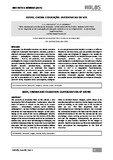| dc.creator | Lima Neto, Avelino Aldo | |
| dc.creator | Nóbrega, T. P. | |
| dc.date.accessioned | 2017-04-07T20:07:51Z | |
| dc.date.available | 2017-04-07 | |
| dc.date.available | 2017-04-07T20:07:51Z | |
| dc.date.issued | 2015-01-02 | |
| dc.identifier.issn | 1807-1600 | pt_BR |
| dc.identifier.uri | http://memoria.ifrn.edu.br/handle/1044/941 | |
| dc.description.abstract | The research in Education finds in the cinema a new investigative field of exploration. Furthermore, when the object of interest is related to the body in its various nuances - educational, cultural, social historical, philosophical -, we have in films a privileged possibility of extending the experiment of the thought. In this paper, basing on the work of the French philosopher Maurice Merleau-Ponty, we assume that the statutes of the films images in the research domain needs to be envisioned in another way: not as mere methodological strategies, but as indirect language doing the researcher to see and think otherwise. This text, inspired by this assumption, follows the following steps: a reflection on the body and the vision in Merleau-Ponty´s thought, which allows us to question how address ourselves to the images and to the world of visibility, to the visible and to the invisible of what we see. This first inspiration leads to epistemological and ontological nuances that surround the relationship between the body and the cinema. Our point of orientation is the text The cinema and the new psychology, whose reading permeates our view of the real and the imaginary. Subsequently, we present an example of how another treatment of the images is possible. Finally in conclusion we list some implications of these perceptions for investigations in the field of Education. | pt_BR |
| dc.language | por | pt_BR |
| dc.publisher | Instituto Federal de Educação, Ciência e Tecnologia do Rio Grande do Norte | pt_BR |
| dc.relation.ispartof | Holos | pt_BR |
| dc.rights | Acesso Aberto | pt_BR |
| dc.subject | Pesquisa | pt_BR |
| dc.subject | Imagem | pt_BR |
| dc.subject | Cinema | pt_BR |
| dc.subject | Corpo | pt_BR |
| dc.subject | Educação | pt_BR |
| dc.title | Corpo, cinema e educação: cartografias do ver | pt_BR |
| dc.type | Artigo de Periódico | pt_BR |
| dc.publisher.country | Brasil | pt_BR |
| dc.publisher.department | Canguaretama | pt_BR |
| dc.publisher.initials | IFRN | pt_BR |
| dc.subject.cnpq | CNPQ::CIENCIAS HUMANAS | pt_BR |
| dc.citation.volume | 5 | pt_BR |
| dc.citation.issue | 30 | pt_BR |
| dc.citation.spage | 81 | pt_BR |
| dc.citation.epage | 97 | pt_BR |
| dc.description.resumo | A pesquisa em Educação encontra no cinema um novo campo de exploração investigativa. Ademais, quando o objeto de interesse relaciona-se ao corpo e suas diversas nuances – pedagógicas, culturais, sociais, históricas, filosóficas – tem-se, nas películas, uma possibilidade privilegiada de alargar a experiência do pensamento. No presente trabalho, fundamentando-se na obra do filósofo francês Maurice Merleau-Ponty, partimos do pressuposto de que os estatutos das imagens cinematográficas, no universo da pesquisa, precisam ser vislumbrados de outro modo: não como meras estratégias metodológicas, mas como linguagem indireta que faz o pesquisador ver e pensar de outro modo. O presente texto, inspirado nesse pressuposto, configura-se em um percurso assim traçado: o corpo e a visão na filosofia de Merleau-Ponty, que nos permite interrogar o modo como nos dirigimos às imagens e ao mundo da visibilidade, ao visível e ao invisível do que vemos. Essa inspiração primeira nos conduz a nuances epistemológicas e ontológicas que circundam as relações entre o corpo e o cinema. Nosso norte é o texto O cinema e a nova psicologia, cuja leitura impregna nosso olhar sobre o real e o imaginário. Posteriormente, apresentamos um exemplo de como um outro tratamento das imagens é possível. Por fim, à guisa de conclusão, elencamos algumas implicações destas percepções para as investigações no campo da Educação. | pt_BR |




